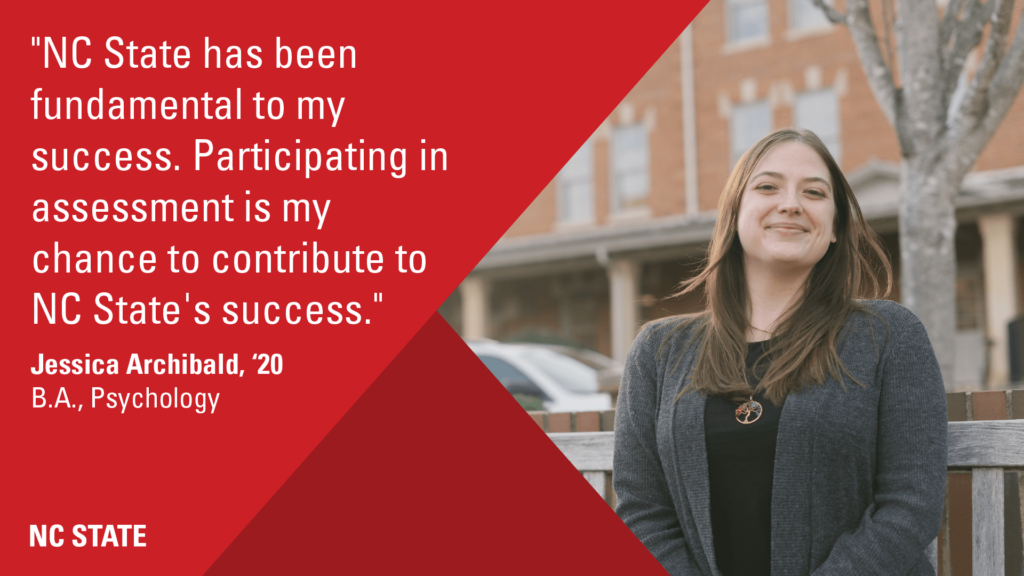Assessment at NC State for Students
Our goal is for students to get the best possible education during their time at NC State. That is why we continuously improve courses and academic programs through assessment of student learning.
Why does assessment matter?
Assessment is a “participatory, iterative process that provides data institutions need on their students’ learning.”1 Assessment involves analyzing learning evidence from students (like portfolios, papers, quizzes, exams, oral presentations, etc.) to help faculty and staff identify strengths and areas for improvement for student learning. At NC State, assessment is student-centered, meaning our goal is to improve student learning and student experiences!
What is a student learning outcome?
Student learning outcomes are at the center of the assessment process. Each course you take has student learning outcomes listed in the syllabus. These “outcomes” are basically learning goals for each student in the course; by the end of the course these are the specific things you should know or be able to do.
Additionally, each major has program-level student learning outcomes. These are goals specific to your field of study that represent the skills and knowledge you should have when you have completed a degree in that area. NC State also has institution-level outcomes; these outcomes are known as the Pack Proficiences. The Pack Proficiencies are competencies that every NC State graduate should have proficiency in by the time they graduate.
How are learning outcomes used in assessment?
Faculty and staff use student learning outcomes as a guide for assessment. Courses and curricula are designed to help students meet those learning goals. Along the way, faculty and staff collect evidence of student learning tied to each of those outcomes to help us figure out how well we are preparing students to achieve those learning outcomes. The assessment evidence collected then helps faculty and staff to make data-informed decisions about how specifically we can improve student learning in individual courses, in degree program curricula, and at the institutional level. The overall goal is to continuously improve the quality of education at NC State.
Learn more below about assessment at NC State and what you can do to help faculty and staff better understand student learning and improve courses/programs for future NC State students!
How do students participate in assessment?
Student participation in assessment is vital for faculty to make data-informed improvements to courses and curricula, and every student participant helps us make NC State even better. There are several ways that NC State students participate in assessments. Many students may have participated in student learning assessment at NC State and don’t even know it!
Students may be passively involved in assessments when they complete coursework. Faculty and staff gather and assess student work to identify strengths and areas for improvement. This assessment may include direct evidence of student learning (such as scoring completed student projects with a rubric, aggregating and analyzing testing data, etc.) or indirect evidence (asking students to reflect on their learning through surveys). Students may also be directly invited to participate in assessments. Each year first-year and senior students are asked to participate in assessments of the Pack Proficiencies using standardized testing instruments.
Faculty and staff analyze first-year and senior data to better understand how students develop their Pack Proficiencies during their time at NC State. Assessment staff use multiple strategies for developing their assessment samples, direct recruitment of students via email and in-class assessments are two strategies.
Students may also be asked to participate in University surveys from Institutional Strategy and Analysis and the Division of Academic and Student Affairs including the First Term Survey, the Sophomore Survey, Future Plans Survey, Graduating Senior Survey, and Alumni Survey, among others. Aggregated survey data help faculty and staff better understand student experiences and help us determine how we’re meeting learning outcomes. Survey results are also shared with our accrediting body, the Southern Association of Colleges and Schools Commission on Colleges (SACSCOC). It’s important that students complete these surveys so that their diverse experiences and voices are represented.
Why should students participate in assessment?
Students play an essential role in helping make NC State better through assessment. When students participate, they enable faculty and staff to further improve the quality of their education through course and curriculum improvements. Assessment is a tradition in the NC State community and it is win-win for students and faculty. If you get the opportunity to participate in assessment while at NC State, show your Wolfpack pride and do your part to help make NC State even better!
What are faculty and staff assessing?
Assessment is a best practice that helps NC State faculty and staff better understand how students meet stated learning outcomes. Your course learning outcomes are stated in your course syllabus, and the learning outcomes for your major are available online. Faculty use aggregate data from assessments to report on how well students meet program learning outcomes through an annual reporting process. When faculty determine that there is room for improvement in a certain learning outcome, they may adjust their teaching strategies, assignments, and/or coursework to improve student learning in that area. NC State reports assessment activity to SACSCOC.
What are the Pack Proficiencies?
While some student learning outcomes are specific to particular courses or majors, the Pack Proficiencies are the 5 skills that every NC State student is expected to develop before graduation. Faculty and staff introduce the Pack Proficiencies in the General Education Program and reinforce them throughout NC State courses and academic programs. Assessment of these proficiencies is a university-wide responsibility among faculty, staff, and students.
The 5 Pack Proficiencies are:
Pack Proficiencies represent essential life skills that students will need to be engaged citizens, thoughtful consumers of information, and successful in their future careers. The Pack Proficiencies are also known as NC State’s “General Education Competencies.” Each skill has several associated student learning outcomes.
How are the Pack Proficiencies assessed?
NC State assesses the Pack Proficiencies in first-year and senior students. First-year students are assessed in the fall semester, and they may complete an assessment in class. Historically, assessment staff have partnered with faculty in Health and Exercise Studies and the First Year Writing Program to recruit first-year participants. Additionally, NC State invites all eligible graduating seniors to participate in assessment of the Pack Proficiencies each spring. Pack Proficiencies are assessed on a three-year cycle and outcomes are measured using competency-specific instruments.
We assess first-year and senior students so that we can determine how students’ competencies develop during their time at NC State. Data are often not longitudinal. This means that students who did not complete an assessment as a first-year student may still be asked to complete an assessment as a senior. All assessment data are aggregated and no individual student data is ever shared with faculty.
Learn More
1The definition of “assessment” and additional information about the measurement of student learning is available from the National Institute for Learning Outcomes Assessment’s “Assessment Glossary.”


